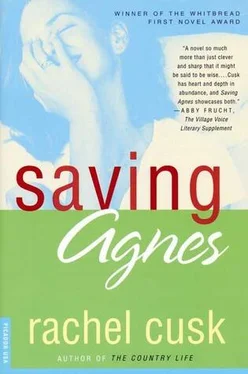Agnes sat in silence. She wished she had never asked Greta about her father. She was unequal to such revelations. There had been a time, a while ago, when she had felt embarrassed by Greta’s candour and somehow superior to it. Now, however, she felt embarrassed by her own inadequacy. Greta had shown her a secret wound, and Agnes had merely driven slowly by like a prurient motorist past a pile-up. She remembered the first night her lover had come back to her house, when they had sat on the bed exchanging pleasantries while the unspoken thrashed and flailed between them. She wondered when exactly in her life she had ceased to act, had ceased to be effective. Every time she came to the brink of another person, their borders lapping, she would draw back, afraid to jump across.
‘Has something happened?’ she said then, rather stiffly.
Greta nodded. Tears began to roll down her cheeks.
‘I was raped!’ she cried, shaking her head. ‘I — he raped me!’
‘Who?’ said Agnes, horrified. ‘Your father?’
‘What? No, not him. That guy, the one — the guy I met on the tube. London Transport.’
She began to sob uncontrollably. Agnes got out of her chair and knelt awkwardly beside her.
‘Do you want to talk about it?’ she said. This was a line borrowed from innumerable television dramas which Agnes had hoped to pass off as her own.
‘Not really,’ gasped Greta, her chest heaving.
Agnes regarded her in agony of uncertainty. The television dramas had never dealt with rebuffal. She put a tentative arm around her, and felt Greta sag heavily against it.
‘He came here last night,’ she said thickly. ‘He said he wanted to talk so I let him in. I let him in!’ she cried, turning her shiny face incredulously to Agnes. ‘And he wouldn’t leave, so I said I was going to call the police and then he just kind of came up behind me. And there was nothing I could do. Nothing! He was really strong, you know? I didn’t know people were that strong. I just — I just screamed and screamed.’ A strangled laugh escaped from her throat. ‘And then I hit him with that hat-stand over there. I guess I must have drawn blood. And then he left.’
Agnes felt Greta’s body shake, and then realised that she herself was shaking. She felt sick to her stomach. Her heart felt strangely as if it were actually bleeding. She also felt something else, something rather like anger or disappointment; a blind, enraged surge of bitterness that the world should turn out to be so cruel and inferior a place, when all they had ever done was believe in its authority.
Down at the police station, Greta sat on a bench while Agnes attempted to attract the attention of one of the officials on duty. The station was bleak and neon-lit, and the air was heavy with misdemeanour. A man with wild nest of grey hair was striding up and down the waiting area, ranting at those who entered.
‘It’s black against white,’ he informed Agnes. ‘The forces of evil are rising up, all around! They come by night — they come by night, in the darkness, when we can’t see them. They prowl through the streets!’
‘Go home, then,’ said Agnes curtly. ‘That way you won’t have to worry about it.’
The man strode off, muttering. A few minutes later, Agnes secured a policewoman and related Greta’s misfortune. The woman went to make her a cup of tea. When she returned, she informed Greta that she would have to go to hospital, but that first she would have to give details of the incident. Greta assented quite cheerfully. She seemed to have recovered some of her composure.
‘And then I whacked him over the head with a hat-stand,’ she informed the balding policeman who was taking notes.
‘A hat-stand.’
‘Yeah. Victorian mahogany with these kind of curly bits at the top. Oh, yeah, and when he was leaving I yelled after him, “You bastard, you could at least have worn a condom.” ’
The policeman’s face twitched.
‘Is that all?’ he said.
‘Well, what did you expect me to do?’ Greta demanded. ‘Invite him back for goddamned elevenses?’
Finally Agnes got Greta home. She put her to bed, and stood for a moment watching her sleep. Her face was open and vulnerable. It alerted Agnes to the presence of something new in herself, something small and hard like a marble. By the time she left, it was growing dark.
Agnes was stalking the streets which once had stalked her. The elegant Georgian façades of Camden, which by day showed daring glimpses of adventurous curtain and flashes of brave scrubbed pine, by night glimmered palely behind shutters in streets which now seemed empty and afraid. Another city had taken charge, crawling down from trees and out of sewers, roosting in doorways among overstuffed garbage bags and trawling the littered pavements of the high street like antithetical shoppers. It was doubtlessly the latter’s aspect of ownership which nightly sent the management scuttling back to their terraces to ponder the insuperables of social injustice over dinner and wine, and there were many occasions on which Agnes would have joined them. For tonight, however her loyalties lay with those whose hearts were hard. They were not emasculated, as she had been, by sympathy. Their cold nights and hungry days had lent them a certain menace. She had seen their misery eulogised in various artistic black and white photographs, a Brueghel glow of quirky despair in their faces as their souls shone beneath the skin for want of better lodging. Well, tonight she too lived in her own skin, homeless. Tonight she was a predator, sly as a guttersnipe.
She reached the lock and paused on the bridge for a moment looking out over the canal. The water looked dark and thick as blood. There was no moon overhead and the sky was black, like an empty space. A car passed behind her and someone shouted, ‘Don’t jump!’ through the window as it sped away. People were so careless with one another, she thought as she turned and continued walking. They should be taught a lesson, and who better to teach it than they, the underclass, those who had been wronged?
A man walked past her on the pavement. He had been eyeing her uncertainly as he approached, as if trying to discern whether she was an object of admiration or studied avoidance. It was a look she had been getting a lot lately. Her signals had been growing dimmer and harder to read. She stared at him rudely, which at least had the effect of resolving his own dilemma. He looked away and dug his hands in his pockets.
‘Hi, sexy!’ she said loudly as he walked by her.
She heard him stop on the pavement behind her. She could feel his shock without even looking back at him.
‘ What? ’ he said, as if to himself.
She walked on unperturbed and eventually heard his diminishing footfalls as he walked away. Agnes smiled to herself. Weakness, she thought then, was, after all, nothing more than fear. Strength, consequently, must be becoming that which you feared. She began to laugh. Soon she was laughing so hard that she had to sit down in a doorway and clutch at her sides.
‘Keep laughing, love. They say it stops ye crying. That’s what they say, eh?’ said a woman next to her.
‘I suppose so,’ replied Agnes, getting a grip on herself. She had thought she was alone.
‘What’s so bloody funny anyway?’ said the woman.
She had a high-pitched voice and a Scottish accent. She was so tiny that Agnes would have mistaken her for a child had she not already seen the handbag face clenched tight as a withered fist. She wore a red coat and was sitting with her knees drawn up and her feet in a plastic bag.
‘Tell us, Miss Tee-Hee, what’s the joke?’
‘Oh, it’s only an old joke,’ said Agnes. ‘The one about the man and the woman. It’s not really very funny.’
Читать дальше












